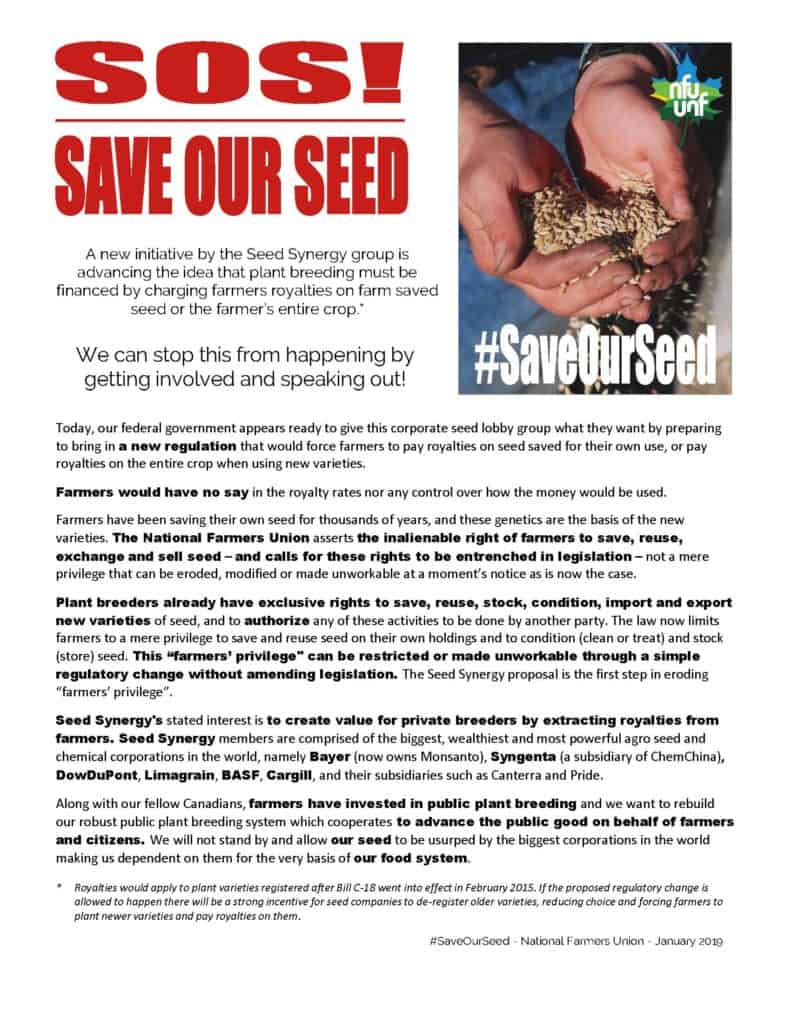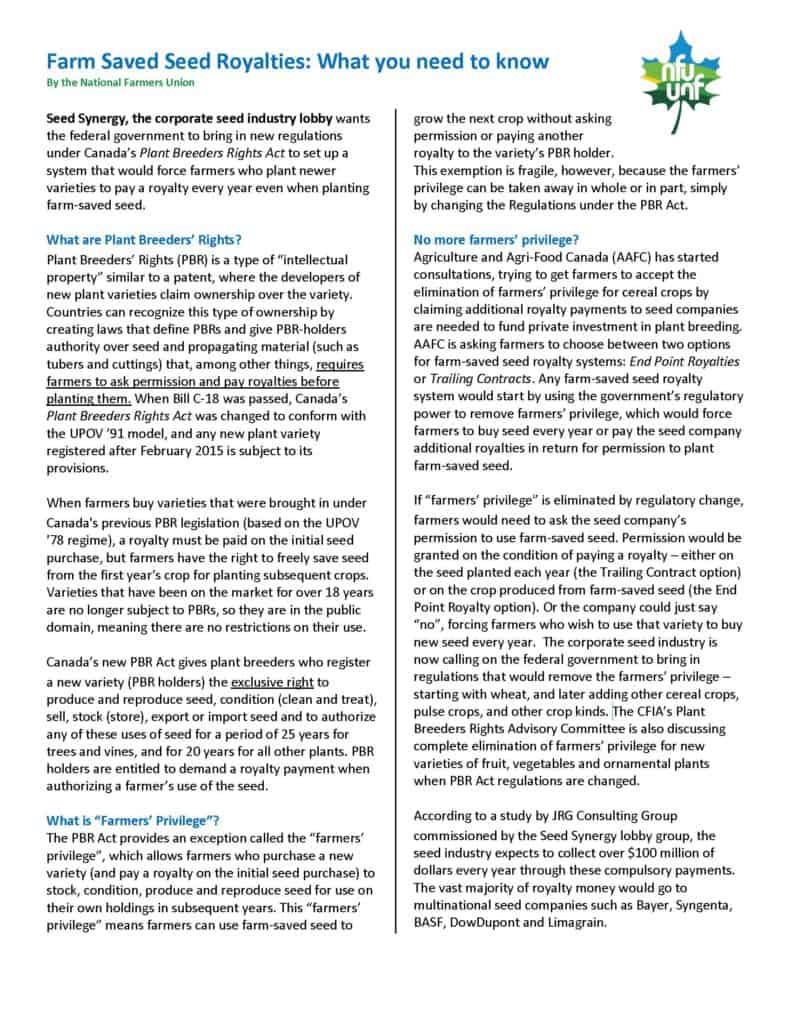
Keep Farmers’ Right to use Farm Saved Seed!
The corporate seed industry wants to make farmers pay seed companies for seed every year even when we use farm-saved seed. This could be done by changing regulations under the UPOV ’91 Plant Breeders Rights Act. The seed industry claims that by charging royalties on farm saved seed, private companies would get a better return on investment, encouraging them to do more plant breeding in Canada. Such a system would result in privatization of our plant breeding system, higher seed costs for farmers, seed bred to serve corporate goals such as increased herbicide sales, and more surveillance and control over farmers.
The NFU opposes the UPOV ’91 seed law, which Canada enacted in 2015, because it turns farmers’ age-old right to save and use farm saved seed into a privilege that can be taken away by regulation. We call for keeping farmers’ right to save and use our own seed, and for public funding and farmer-controlled check-off funding to support plant breeding in the public interest.
In 2018 Agriculture and Agri-Food Canada (AAFC) held a series of consultation meetings with farmers in several locations across Canada, asking which system of increasing seed costs and reducing farmers’ ability to use farm saved seed they preferred: End Point Royalties or Trailing Contracts. The End Point Royalty approach would require farmers to pay a royalty on their harvested crop (a per bushel royalty) if they grow a newer variety. The Trailing Contract approach would require farmers get seed company for permission and pay a royalty in order to plant seed saved from previous crop when using a newer variety covered by UPOV 91 Plant Breeders Rights. The seed industry liked the Trailing Contract option best because it would both bring in more money and would involve setting up a comprehensive data collection system to track farm saved seed users. The seed industry calculated they could collect over $100 million of dollars every year from these compulsory payments. This money would go to seed companies such as Bayer, Syngenta, BASF and DowDupont (now Corteva). The system for charging a royalty on crops harvested from farm saved seed would be developed for wheat first, with the intent of applying it to other cereal crops, pulse crops, and other crop kinds later.
Not surprisingly, farmers resoundingly rejected both options. By August 2020 AAFC had officially retreated from this proposal, but the corporate seed lobby is still trying to bring in payment for farm saved seed in other ways, including “Variety Use Agreements” which are modeled after Trailing Contracts, but implemented by the seed companies, not by regulation.
The NFU is opposed to End Point Royalties, Trailing Contracts and Variety Use Agreements. These are simply ways to increase the monopoly power of seed companies by forcing farmers to pay more for seed, restricting farmers’ right to save seed and making us pay them for seed we grow on our farms.
Variety Use Agreements
Variety Use Agreements (VUAs) are contracts that require farmers to pay the seed company a certain amount per acre every year in order to use farm saved seed of their varieties. Some companies are releasing all of their new varieties with this private version of a royalty payment in order to restrict access to seed and enforce annual payments from farmers who use the age-old practice of saving some of their harvest to use for seed the next year. This has a significant impact on farmers’ rights and a means for the seed industry to make more money from farmers.
In 2022 SaskPulse set up a partnership with Limagrain, a multinational seed company, whereby the company will have an exclusive role in developing pea and lentil varieties for Saskatchewan, and when released, these varieties will all be sold with VUAs attached. SaskPulse collects a levy (check-off dollars) from Saskatchewan farmers every time they sell pulse crops, providing millions of dollars of research funding. Due to the terms of this partnership, the results of the research will only be available under VUA contracts, requiring farmers to pay again.
Read more about the implications of this agreement for farmers, seed prices and the right to save seed in the two-page leaflet, Taking the pulse of private royalties: Producers pay, and pay again.
Action alert – Vote at SaskPulse AGM to STOP farm saved seed royalties on new varieties! Click on this link for details, then copy and paste the text into an email to share with other Saskatchewan farmers who grow pulse crops and want to protect their right to use farm saved seed.
No royalties on farm saved seed! – 2018 Campaign info

Save Our Seed leaflet SOS – Save Our Seed! A new initiative by the Seed Synergy group is advancing the idea that plant breeding must be financed by charging farmers royalties on farm saved seed or the farmer’s entire crop. We can stop this from happening by getting involved and speaking out! Download and print this 2-page SOS handout for distribution at events.

Farm Saved Seed Royalties: What you need to know – The National Farmers Union calls for keeping farmers’ right to freely save and use our own seed, and for public funding and farmer-controlled check-off funding to support plant breeding. We oppose any regulation to take away or restrict the “farmers’ privilege” under the Plant Breeders Rights Act. Download and print this 2-page FSS handout for distribution at events.

Save Our Seed Postcard – Download this postcard and send the file to your local print shop for printing on card stock then distribute to people to send to their MPs. Just write in the MP’s name – the postcard is pre-printed with the House of Commons mailing address.
Stay informed. National and local farm news, research, policy and advocacy efforts, straight to your inbox.
Subscribe to email updates from the National Farmers Union.
Do you work in media? Contact communications@nfu.ca for media-specific communications.